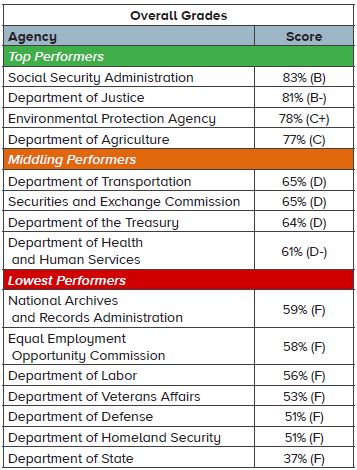Government Agencies Failing On Freedom Of Information
A watchdog report out this week reveals that none of the Federal agencies that receive the greatest number of Freedom of Information Act requests are going to great effort to provide Americans with access to information.
The Center for Effective Government report, titled “Making the Grade: Access to Information Scorecard 2014,” rates seven of the 15 agencies with an “F” in the transparency department. None of the agencies in the group that handles 90 percent of FOIA requests received an “A.”
The Center for Effective government graded the agencies on the following criteria:
- Processing requests for information (the rate of disclosure, the fullness of information provided, and timeliness of the response);
- Establishing rules for information access (effectiveness of agency policy on withholding information and communicating with requesters); and
- Creating user-friendly websites (facilitating the flow of information to citizens, online services, and up-to-date reading rooms).
The watchdog group called the findings of the analysis “sobering.”
“The low scores are not due to impossibly high expectations. In each of three performance areas, at least one agency earned an A, showing that excellence is possible,” The Center for Effective Government said in a release explaining the results. “But the fact that no agency was able to demonstrate excellence across all three areas illustrates the difficulty agencies seem to be having in consistently combining all the elements of an effective disclosure policy.”
Here’s how the agencies stacked up:
The report detailing Federal agencies’ FOIA failures comes as lawmakers on Capitol Hill are giving serious thought to transparency reforms to strengthen FOIA.
Last month, a bipartisan FOIA reform bill introduced by House Oversight Committee Representatives Darrell Issa (R-Calif.) and Elijah Cummings (D-Md.) passed with unanimous support.
The Senate has yet to pass a version of the popular House legislation. But during a Judiciary hearing Tuesday, the lack of Federal transparency in recent years was at the center of discussion.
Senator Chuck Grassley (R-Iowa) and Judiciary Chairman Patrick Leahy (D-Vt.) expressed interest bringing forth the FOIA Oversight and Implementation Act to increase government transparency and require that Government Information Services, which was established in 2007 to serve as a sort of FOIA ombudsman, answer to Congress. Currently, OGIS takes recommendations and reports to the White House Office of Budget and Management.
Meanwhile, FOIA activists want to take away the exemptions that Federal agencies so often use to avoid complying with FOIA requests.
“Foremost among these, the open government community would like to see Congress put tighter boundaries around the government’s overuse of FOIA’s Exemption 5, or, as many requesters like to refer to it, the ‘We don’t want to give it to you’ exemption,” said Amy Bennett, the assistant director at OpenTheGovernment.org. “Exemption 5 is intended to protect the government’s deliberative process and was intended to have narrow application. Over time, federal agencies have expanded the scope of Exemption 5 to the point that it covers practically anything that is not a final version of a document.”

No comments:
Post a Comment
Thanks for commenting. Your comments are needed for helping to improve the discussion.